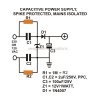I need ~50mA ~5V PSU's and found this isolated transformerless design on the net.
C1 and C2 are PolyPropylene which are the only expensive components (found these).
Obviously we need a fuse on the hot side. One thing that worries me is what happens when the zener fails. If it goes open circuit we are back to 120V.

**broken link removed**
C1 and C2 are PolyPropylene which are the only expensive components (found these).
Obviously we need a fuse on the hot side. One thing that worries me is what happens when the zener fails. If it goes open circuit we are back to 120V.

**broken link removed**
